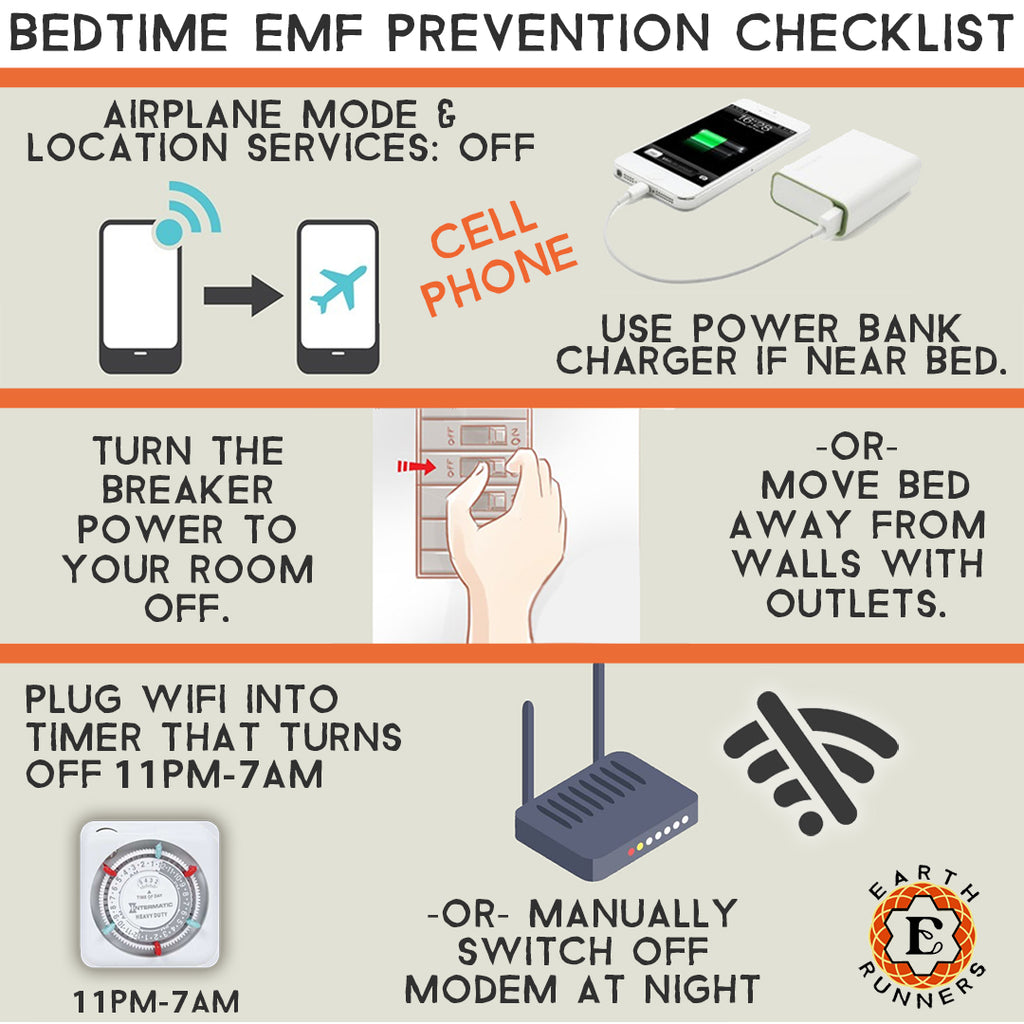EMF Protection: Biohacking Your Bedroom for Better Sleep
Sleep is an essential biological function and EMF (electromagnetic frequency) radiation is one of the most overlooked factors affecting optimal sleep in the modern day. While you’re asleep, your body is recalibrating and regenerating itself to function optimally. This includes physiological repair, as well as mental repair (repairing neurotransmitters and manufacturing neurochemicals). However, in order to do its job effectively, your body needs an environment conducive to getting the best sleep possible. This encompasses visible and tactile factors, like sleeping in a dark and cool room, but also includes other details that are often overlooked, such as EMF protection.
Dubbed “sleep hygiene,” practicing good bedtime habits is just as important as other forms of hygiene, such as brushing your teeth and taking showers. Getting quality natural sleep ensures you are ready to tackle everything the next day has in store and is mandatory for optimal health and athletic recovery! Without further ado, here are some of the easiest and most effective ways to biohack your bedroom for better sleep.
EMF Protection Strategies
EMF radiation is emitted from cell phones, computers, microwaves, wifi, electric blankets, and virtually all other electronic devices. Devices that emit electromagnetic frequencies have completely infiltrated our society; most of us have EMF radiation in all rooms of our house—including the most fundamental—the bedroom.

Perhaps due to the novelty of recent tech developments, such as wifi and cell phones, EMF-emitting devices quickly became a staple of modern life. Unfortunately, these devices rapidly gained popularity before we knew the full scope of their biology-altering powers. Through extensive research and studies conducted on the effects of EMF radiation exposure, we now know the health implications these frequencies pose.
EMF radiation can literally alter your DNA and gene expression.[1,2] Think of EMF exposure like a microwave for your body--which works by heating the water molecules though high frequency vibration. As you may know, our bodies are over 50% water.[3] The most mild implication of EMF exposure is feeling tired all the time, due to the constant stress the radiation causes on a cellular level.[4,5] In more extreme cases, these frequencies lead to tumors and cancer.[6]
Most of us have become so accustomed to the symptoms of being around EMF all the time that we don't even realize it. Headaches, brain fog, and inflammation are all symptoms of EMF exposure.[7] This radiation affects you on a cellular level, which actually hurts your immune system.[8] In addition, scientists have found that EMF radiation may actually sterilize men by reducing quality and mobility of sperm.[9,10] Keeping your cell phone in your pocket or using a laptop on your lap puts the radiation right next to "your goods," which can cause prostate and other cancers that lead to infertility.[11]
In the state of sleep, while our fine-tuned biology is in the process of recalibrating, our body is the most susceptible to the disruptive effects of EMF radiation.
EMF Protection: Measures for Better Sleep
The only way to know how much EMF radiation you are being exposed to is by using an EMF meter to measure the levels in your environment. Whether you have an access to an EMF meter or not, there are several known sources of EMF radiation which we can take steps to mitigate.

- Put your phone on airplane mode at night. Don’t forget to turn off “location services,” which stays on even in airplane mode. Better yet, turn your phone off altogether.
- If you use your cell phone as an alarm and need to charge it at night in your bedroom, recharge your phone using a portable cell phone power bank to avoid having it plugged into the power grid near your bed.
- Use a wifi timer to automatically turn off your wifi at night (and back on in the morning). As an alternative, you could just plug your router into a power strip that you flick off before bed and turn on again in the morning.
- Avoid sleeping in a bed close to smart meters or live wires. If you have access to your breaker panel, turn the power to your room off at night and use battery powered light in your room instead.
- Consider a specialized EMF protection bed canopy if you are unable to mitigate wifi in your sleep space.
- Earthing bed sheets are a great way to help normalize your circadian biology by providing your body the grounding frequencies we have evolved with for millenia.
- There are some companies, such as Magnetico, that manufacture protective sleep pads. The static magnetic field created by the 300 lb magnets in the sleep pad that goes under your mattress deflects many of the EMF radiation created by home electronics.
Reduce Sources of Light in the BLUE LIGHT Spectrum
In addition to EMF radiation, blue light (a part of the electromagnetic spectrum) is emitted from most light bulbs, tablets, phones, TVs, computers, and other electronics with screens and lights. Blue light emission signals to your brain that it’s time to be alert by mimicking the spectrum of light present in noon day sunlight. Think about it: the sun gives off light in the cool (blue) spectrum during the day, while the evening sunset is warm (composed of red & yellow light). Firelight is also in the warm spectrum, which is the only source of 'man-made' light our ancestors would have seen after the sun went down! Blue light at night confuses the body and alters our circadian rhythm by preventing melatonin from being produced at night, and jeopardizes your overall quality of sleep.[12,13]

- Reduce your blue light exposure after the sun goes down to avoid jeopardizing your melatonin production.
- If you have to look at a screen at night, there are apps that limit the blue spectrum your device emits, like f.lux for your computer and Night Shift on the iPhone.
- If you can’t alter blue light sources, wear blue-blocking glasses after the sun goes down.
- Avoid fluorescent or LED lights as the sun starts to set. LED and fluorescents not only have a high blue light spectrum, they have a high flicker rate as well, which also disrupts your biochemistry by exposing you to extremely high frequencies (100-120 cycles per second).[14] Switch to incandescent lights for your evening and nighttime lighting for a more natural, warm spectrum, low flicker rate lighting. Candles are the best option offering the most natural form of lighting for our biology.
More Strategies for Healthy Sleep Hygiene
Have you heard of “sleep hygiene”? Sleep hygiene is comprised of several strategies that, when implemented into your bedtime routine, set the stage for a great night's sleep:
- Avoid working out before bed. While exercising during the day will help you get great sleep that night, working out in the evenings is not in line with your circadian biology and will cause an endorphin boost that makes it hard to fall asleep.
- Avoid consuming alcohol, coffee, caffeinated tea, and other stimulants at least 6-8 hours before bedtime. Keep in mind, caffeine has a half life of 6 hours and can stay in your body for up to 12 hours, so give yourself an appropriate cutoff time.
- Use blackout curtains and cover up any sources of light. While blue light disrupts your melatonin and circadian rhythm, any light that hits your body at night (even your skin due to its photoreceptors) can prevent you from getting deep restorative sleep. Avoid light-up clocks, turn off anything in your bedroom that produces light, and use a couple layers of duct tape over any little lights that you can’t unplug.
- Keep the bedroom cool as it is natural for your body temperature to drop a few degrees during the night. Having a cool bedroom will simulate a more natural sleep environment signaling to your body that it’s time to sleep. Aim for a temperature in the mid 60s, the ideal range conducive to sleep.[15]
- Stop eating a few hours before bedtime as it hinders your body's ability to allocate its energy to detoxification and regeneration. Ancient cultures would typically eat their last meal as the sun was setting, which is most aligned with our circadian biology.
- Implement the EMF protection strategies outlined above for better sleep.[16,17]
Ancient Circadian Sleep Strategy
A sleep strategy in alignment with the natural circadian rhythm of our planet and biology simulates the daily experience of our hunter-gatherer ancestors. The therapeutic benefits of these ancient practices are unavoidable in a camping scenario, in touch with the land, and it is up to us to incorporate biologically-friendly practices into our modern lifestyles.
References
[1] https://www.sciencedirect.com/...S138357180
[2] https://www.sciencedirect.com/...S004763740
[3] https://www.thoughtco.com/...609406
[4] https://www.ncbi.nlm.nih.gov/...PMC5279981/
[5] https://www.ncbi.nlm.nih.gov/...PMC3561068/
[6] https://www.nature.com/...bjc2014606
[7] https://www.sciencedirect.com/...S2213879X
[8] https://www.ncbi.nlm.nih.gov/pubmed/19398310
[9] https://www.sciencedirect.com/...S08906238090
[10] https://www.ncbi.nlm.nih.gov/...PMC4074720/
[11] https://thetruthaboutcancer.com/phone-radiation/
[12] https://www.ncbi.nlm.nih.gov/pmc/articles/47341
[13] https://www.ncbi.nlm.nih.gov/pubmed/25535358
[14] https://www.ncbi.nlm.nih.gov/pubmed/22512841
[15] https://www.sleep.org/temperature-for-sleep/
[16] https://www.ncbi.nlm.nih.gov/pubmed/10188140
[17] https://www.ncbi.nlm.nih.gov/pubmed/23051584






